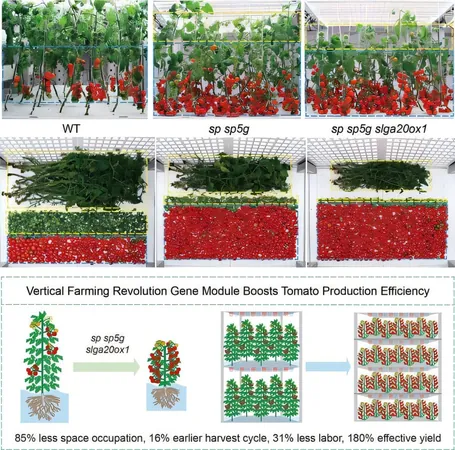
Revolutionizing Tomato Farming: Genetic Engineering Boosts Vertical Crop Production
2025-05-28
Author: Emily
Genetic Breakthrough Sets New Standard for Vertical Farming
A groundbreaking study led by Prof. Xu Cao from the Institute of Genetics and Developmental Biology at the Chinese Academy of Sciences has unveiled a genetically engineered tomato variety designed to transform vertical farming. This innovation significantly enhances production efficiency and paves the way for more sustainable agriculture.
The Challenge of Vertical Farming
Vertical farming, where crops are grown in stacked layers in controlled environments, promises to solve the pressing issues of climate change and urbanization. However, it faces major hurdles: high energy consumption and a lack of suitable crop varieties. Most traditional crops, especially fruiting vegetables like tomatoes and peppers, have complex growth patterns that make them unsuitable for the confined spaces of vertical farms.
An Ingenious Solution to Overcome Obstacles
By merging Green Revolution gene homologs with anti-florigen genes through advanced genome editing, Xu's team has tackled these challenges head-on. Their research, published in the Journal of Integrative Plant Biology, reveals how manipulating the SlGA20ox1 gene leads to a more compact tomato plant, ideal for high-density farming.
Stunning Results from Controlled Experiments
In trials conducted at commercial vertical farms using multilayer LED hydroponic systems, the engineered tomato variety exhibited remarkable outcomes. The innovative slga20ox1 mutant not only reduced space usage by an impressive 75% but also achieved a staggering 38-69% increase in fruit yield. Furthermore, combining this with SP and SP5G genes created a superior architecture that accelerates flowering and synchronizes fruit ripening.
A Game-Changer for Food Security
This study isn’t just a win for tomato farmers. The conserved nature of the gibberellin and florigen pathways across different crops holds the potential for customizing other solanaceous vegetables for vertical farming, heralding a new era in agricultural efficiency. With growing global challenges such as dwindling arable land and increasing food demands, this research offers a promising solution for enhancing food security well into the 21st century.
The Future of Vertical Farming Is Here
As researchers continue to innovate, the combination of genome editing and vertical farming techniques may provide the much-needed boost in crop production. This landmark achievement promises to change the face of agriculture, making it more sustainable, efficient, and capable of meeting the food needs of our rapidly growing urban populations.









 Brasil (PT)
Brasil (PT)
 Canada (EN)
Canada (EN)
 Chile (ES)
Chile (ES)
 Česko (CS)
Česko (CS)
 대한민국 (KO)
대한민국 (KO)
 España (ES)
España (ES)
 France (FR)
France (FR)
 Hong Kong (EN)
Hong Kong (EN)
 Italia (IT)
Italia (IT)
 日本 (JA)
日本 (JA)
 Magyarország (HU)
Magyarország (HU)
 Norge (NO)
Norge (NO)
 Polska (PL)
Polska (PL)
 Schweiz (DE)
Schweiz (DE)
 Singapore (EN)
Singapore (EN)
 Sverige (SV)
Sverige (SV)
 Suomi (FI)
Suomi (FI)
 Türkiye (TR)
Türkiye (TR)
 الإمارات العربية المتحدة (AR)
الإمارات العربية المتحدة (AR)